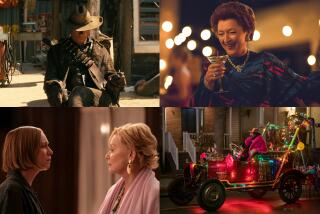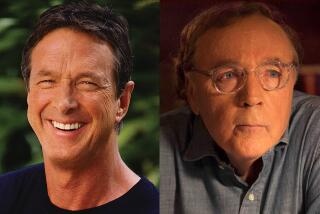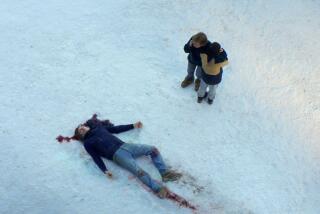The Opening Scene Is the Thing
- Share via
How do you get readers hooked?
Michael Crichton knows: Just start telling a story. And no matter how complex it’s going to get, draw them in with an opening scene as innocent as a blanket of daisies over quicksand.
In his latest novel, “Airframe” (Knopf, 1996) Crichton has moved from the world of dinosaur bones to commercial airlines, drawing tension by pitting the airline industry with its obsessive attention to safety against the exploitative world of television news with its constant need for sensation.
The high-suspense story line constructed with layer upon layer of technical and physical detail is the Crichton hallmark, familiar to readers of his 10 novels and fans of his hit NBC-TV drama “ER.”
But while “Airframe” eventually delves into the drive track and hydraulic actuator minutiae of jet plane maintenance, it opens with a human vignette:
“Emily Jansen sighed in relief. The long fight was nearing an end. Morning sunlight streamed through the windows of the airplane. In her lap, little Sarah squinted in the unaccustomed brightness as she noisily sucked the last of her bottle, and pushed it away with tiny fists.”
This slow-windup technique has served Crichton and his publishers (Knopf for hardcover, Ballantine for paperback) well for 30 years. Here’s a sampling of Crichton opening scenes:
“The Lost World,” 1995: “The Santa Fe Institute was housed in a series of buildings on Canyon Road which had formerly been a convent, and the Institute’s seminars were held in a room which had served as a chapel. Now, standing at the podium with a shaft of sunlight shining down on him, Ian Malcolm paused dramatically before continuing his lecture.”
“Disclosure,” 1993: “Tom Sanders never intended to be late for work on Monday, June 15. At 7:30 in the morning, he stepped into the shower at his home on Bainbridge Island.”
“Jurassic Park,” 1990: “The tropical rain fell in drenching sheets, hammering the corrugated roof of the clinic building, roaring down the metal gutters, splashing on the ground in a torrent. Roberta Carter sighed and stared out the window.”
“Sphere,” 1987: “For a long time the horizon had been a monotonous flat blue line separating the Pacific Ocean from the sky. The Navy helicopter raced forward, flying low, near the waves. Despite the noise and the thumping vibration of the blades, Norman Johnson fell asleep.”
“The Terminal Man,” 1972: “They came down to the emergency ward at noon and sat on the bench, just behind the swinging doors that led in from the ambulance parking slot.”
“Andromeda Strain,” 1969: “A man with binoculars. That is how it began: with a man standing by the side of the road, on a crest overlooking a small Arizona town, on a winter night.”
Michael Crichton is among the more than 200 authors scheduled to appear at the Los Angeles Times Festival of Books next Saturday and Sunday at UCLA. Admission is free. For information, call (800) LA-TIMES, Ext. 7BOOK.
More to Read
Sign up for our Book Club newsletter
Get the latest news, events and more from the Los Angeles Times Book Club, and help us get L.A. reading and talking.
You may occasionally receive promotional content from the Los Angeles Times.









